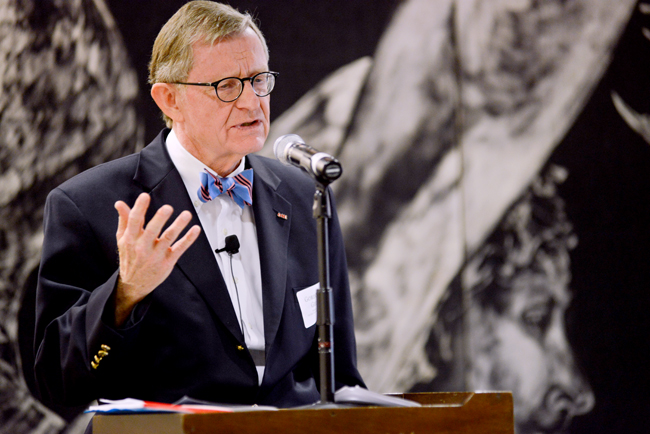The UT System Board of Regents, President William Powers Jr. and President Barack Obama have all issued calls to raise graduation rates, and in the search for solutions, the University is turning to the ultimate experts: actual college educators.
UT hosted a panel Monday to discuss “An Open Letter to College and University Leaders: Completion Must Be Our Priority,” the report released last month by the National Commission on Higher Education Attainment. The report states that “our goal was to look at this issue from the viewpoint of college and university leaders.”
Panel participants included E. Gordon Gee, president of Ohio State University and chairman of the commission; Molly Corbett Broad, president of the American Council on Education; UT-El Paso President Diana Natalicio; and George Martin, president of St. Edward’s University.
The report, released in January, offered a range of suggestions under three broader categories: changing campus culture to boost student success, improving cost-effectiveness and quality and making better use of data to boost success. UT has already undertaken some of the goals laid out in the report, including appointing David Laude as senior vice provost of enrollment and graduation management.
Gee said appointing such an officer was a vital step in shifting the focus exclusively from boosting enrollment rates.
“We have vast institutions called admissions offices, but we don’t have any offices focused on completion,” Gee said.
Natalicio emphasized the impact a cultural shift can have on completion rates. She also mentioned her preference for the term “completion rate” rather than “graduation rate” because typically, graduation rate calculations do not include transfer students or part-time students.
“We’ve been able to change the culture of a community that always saw itself as marginalized and working class,” Natalicio said.
Natalicio attributed a large part of the cultural shift to the work UT-El Paso has done with local K-12 schools.
“We all know that talent crosses gender and ethnic and socioeconomic boundaries, and we were squandering a tremendous amount of talent in the El Paso community,” Natalicio said. “El Paso colleges didn’t reflect the demographic makeup of the community. So we first worked for K-12 to raise aspirations and prepare students for success in higher education.”
Even as the panel discussed their proposed solutions, several members emphasized that universities need to adopt the recommendations on a case-by-case basis.
“Our commission is interesting because we don’t tell people prescriptively what to do — we just tell people to get moving,” Gee said. “There are multiple ways to salvation.”
Broad also emphasized the complicated nature of the college completion issue.
“One size doesn’t fit all is such an understatement,” Broad said. “The great strength of the United States’ educational system is its diversity.”





















